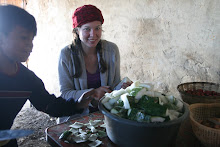Before I came to Guatemala, and even when I first arrived in the Peace Corps, people told me a lot of things about the Guatemalan people. “They are a murderous group,” one neighbor claimed. “They are a small people, and very, very quiet,” said another. “Culturally, they often don’t marry. They just opt for common law marriages.”
“It’s a very machismo kind of society. Women tend to be subservient.”
“Everyone is armed.”
“It’s a society of indirect communication. No one will ever explicitly tell you ‘no.’”
And on and on.
One of the funnest things about being here has been seeing how these stereotypes play out—but more often than that, how they don’t.
All of these statements lump citizens of The Land of the Eternal Spring together as one. And while most cultures have something in common, all of the Guatemalans I know have very distinctive personalities.
For example, we’re all told that the men here have the last word. In a marriage, they run the show, while women just stay at home, cooking, cleaning and popping out babies. But in the families I know, the women are totally in charge. They control the finances, they work, and they make practically all of the important decisions regarding the family.
Then there’s the little old lady in the Puesto de Salud who spontaneously gave us a charla on family planning, explaining to us to use condoms and oral contraceptives. In a society that is supposedly too Catholic to believe in anything other than the rhythm method, this should not have occurred.
Even in my house, where I live with two older sisters who grew up together and are best friends, their personalities are completely different.
One is direct, proud, a career nurse who wisely invests every extra cent she earns. The other is loving and nurturing, but firm, a wife and mother with strong opinions about her family, community and world. While traditional in some ways, she taught her four sons to always show women respect with their words and deeds.
Having all of my preformed assumptions blown out of the water one by one has been a humbling experience. It reminds me how silly it is to ask the question, “What are the people like, there?”
Monday, July 7, 2008
Subscribe to:
Posts (Atom)
